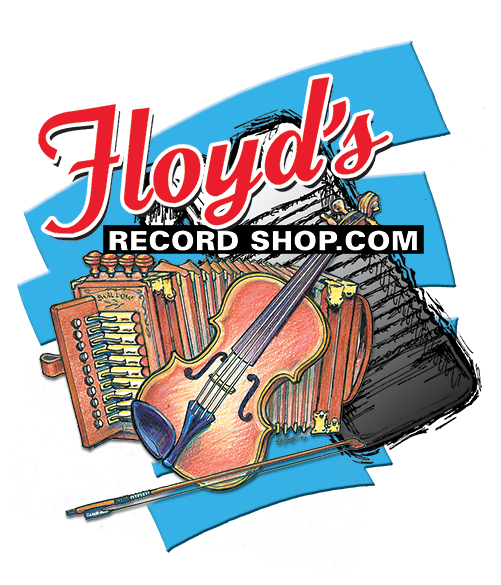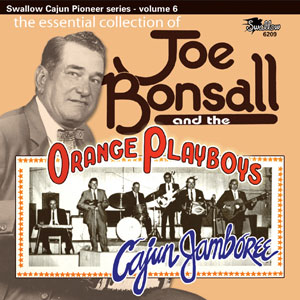A brief history…
Joe Bonsall was born in June 1921 in Lake Arthur, LA. He began playing music at the age of nine, playing the triangle (‘tit-fer) while his mother played the accordion. He soon learned the accordion, the guitar, and violin and played with Lawrence Walker and Joe Falcon at the age of 14.
In 1963, Joe Bonsall contacted John “Tee Bruce” Broussard and asked him to produce recordings and help promote Joe Bonsall and the Orange Playboys. Tee Bruce contacted Floyd Soileau, Swallow Records owner, and partnered to produce records of Joe Bonsall for Swallow label. His popularity grew with each new record release.
As an acknowledgement of the master musician he was, Joe was inducted into the CAJUN MUSIC HALL OF FAME in 1981 joining other greats such as Iry Lejeune, Nathan Abshire, Lawrence Walker, and Sidney Brown.
Joe Bonsall was a strong contributor to the success of the Lake Shore Club Cajun Music Hall of Fame and after the closure of that chapter, in 1990 he co-founded the Lake Charles Chapter of the CAJUN FRENCH MUSIC ASSOCIATION (CFMA) with Phil Menard.
Joe Bonsall passed away in 1996 at the age of 75 but left behind an abundant contribution to our Cajun heritage through his music and efforts spanning over 55 years.
Reviews…
BZ Geezer Music Club, February 2008
Joe Bonsall “Essential Collection”
Every type of music has its legendary performers, but because not all genres are widely popular, many treasured artists are something less than household names. A new album from Swallow Records might help to remedy that, at least as it relates to Cajun music.
Cajun Jamboree, a collection of tunes from Joe Bonsall and the Orange Playboys, does a good job of painting a musical picture of the veteran musician. (Who, by the way, is not the same Joe Bonsall who has spent many years as part of the country music supergroup, the Oak Ridge Boys.)
Born near Lake Arthur, Louisiana, in 1921, Joe grew up immersed in the rich tradition of Cajun music, and as a boy became well-acquainted with accordion, fiddle and guitar. During his teen years his family moved to Orange County, Texas, and Joe soon put together a musical group for local dances, naming them the Orange Playboys.
As Joe reached adulthood, World War II came along and he spent his time as a decorated Marine rather than as a musician, but in the post-war years he drifted back into performing. Gradually working his way up to wider popularity, in 1951 he reactivated the Orange Playboys and began to enjoy a long period of success.
For the next several decades, Joe and his boys were one of the most popular Cajun music groups around, performing in clubs and on radio, along with selling lots of records. Joe was very active in the production end of the recording industry too, and was an original member of the Cajun Music Hall Of Fame. By the time of his death at age 75, his career had stretched for over fifty years and he’d reached legendary status among Cajun music aficionados.
This album, which is called The Essential Collection, is just exactly that. It includes twenty-seven songs and they form an accurate record of the musical heritage of Joe Bonsall. Most were made during the 1960’s, when Joe and his group were at the top of their game and the height of their popularity. Included are some of the group’s original hits, such as “Step It Fast,” and later favorites too — for example one of their biggest hits, a delightful Cajun version of “Bad, Bad Leroy Brown.”
Traditional Cajun music is well-represented, and for those who are fond of the Two-Step, most of it is fine dancing music. For example “Bayou Pon Pon Two-Step” sets a lively pace, as does “La Valse du Passé.” Another one I liked a lot was “Chickens Don’t Lay,” a fun song with a great title.
For dancers who’d rather slow down a little, there are several nice Cajun waltzes of varying speeds, ranging from the energetic “Alléman Waltz,” to the softer “Evangeline Waltz,” a piece that salutes Longfellow’s tragic Acadian heroine. It was probably my favorite on the album.
A solid collection and a rich treasury of the music of a Cajun legend.
Dan Willging www.InTuneLA.com, 2008
Joe Bonsall “Essential Collection”
Over the years, Swallow Records has cultivated their fine Cajun Pioneer Series by showcasing such marquee artists as the Balfa Brothers, Nathan Abshire, DL Menard, Belton Richard and Adam Hebert, all of who played an essential role in Cajun music. The imprint’s latest installment, Joe Bonsall and the Orange Playboys, is a 27-track affair that represents the bulk of Bonsall’s recorded output and provides a snapshot of what stirring Cajun music sounded like between 1964-1975. Additionally, this incarnation of the Orange Playboys was undisputedly Bonsall’s best and included future CFMA award-winning songwriter Ivy Dugas who was only 12 when he joined their ranks. (Dugas’ tenure with Bonsall numbered 18 years.)
Bonsall and the Orange Playboys rose to prominence in the 50s in Southeast Texas where dancehall Cajun music was still in its infancy. Since most of Bonsall’s constituents were Louisiana-bred Cajuns who had relocated across the border for better economic opportunities, his topflight band fulfilled a cultural niche for those craving their dancehall fix. To say that his band was comparable to accordion king Aldus Roger and the Lafayette Playboys isn’t that far off the mark – both were overwhelmingly popular in their respective domains and were featured on local TV, though Roger had a regular weekly series as opposed to Bonsall’s spot appearances.
As an accordionist, Bonsall had a commanding presence as well as precise and lightening quick dexterity on the keys when necessary. Though many standards are listed here, Bonsall and the Orange Playboys wrote over half of these tunes, which includes their biggest hits “Your Picture” and “Grand Prairie Waltz,” written by Bonsall and fiddler Cliff Newman, respectively. Also included is Newman’s “Still Waiting For You” that was previously unreleased.
Though these proceedings may seem somewhat raw to the uninitiated with their heavy kick drum beats, no bass, swirling steel guitar and an occasional overly prominent rhythm guitar. The music is also extremely impassioned, especially when Bonsall and Newman sing as if they’re the broken-hearted protagonists portrayed in many of these songs.
Overall, killer stuff besides being essential.

